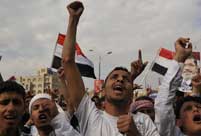 Chinese Air Force's combat group organizes actual-combat training
Chinese Air Force's combat group organizes actual-combat training Demolition of bizarre rooftop villa begins
Demolition of bizarre rooftop villa begins
 Bea Hayden poses for fashion magazine
Bea Hayden poses for fashion magazine
 Indian-controlled Kashmir celebrates Independence Day
Indian-controlled Kashmir celebrates Independence Day
 Left-behind kids' childhood on the side of country road
Left-behind kids' childhood on the side of country road
 'West Lake' in China's Anhui - Pingtian lake
'West Lake' in China's Anhui - Pingtian lake
 How do North Koreans stay cool in summer?
How do North Koreans stay cool in summer?
 China Beijing Int'l Gifts, Premium&Houseware Exhibition opens
China Beijing Int'l Gifts, Premium&Houseware Exhibition opens
 Incredible gardens around the world
Incredible gardens around the world
The political future of the Muslim Brotherhood (MB) has stirred up a lot of debate in Egypt, particularly after the group rejected mediation efforts and insisted on the reinstatement of ousted president Mohamed Morsi until the security ended their sit-ins on Wednesday by force.
The dispersal operation against pro-Morsi sit-ins in Cairo and Giza and relevant clashes across the country have left at least 578 people killed and over 4,200 others injured, leading the interim leadership to announce a state of emergency for a month and impose a curfew nationwide.
Over the past two days, the Brotherhood's loyalists attacked several government premises, police stations as well as Coptic churches across the turmoil-hit country, vowing to hold massive protests on Friday dubbed "Friday of Anger."
Some analysts see that resorting to violence is "a political suicide" for the decades-old group, while others believe that it is "too early" to conclude that the MB's political life is coming to an end.
MB LOSES 'POLITICAL FUTURE'
"There is no longer a political future for the MB movement as it has chosen to engage in confrontations not only with the authorities but also with the people," Gamal Zaharn, a political science professor at Port Said University, told Xinhua.
Noting that Russia has already classified the movement as a terrorist group, the professor said that using weapons and assaulting government headquarters have undermined the group's political future.
However, Mohamed Mansour, head of Future Studies Center of Assiut University, predicted that "they would not give up easily."
On Thursday, Brotherhood's spokesman Ahmed Aref said the National Front for Supporting Legitimacy, an anti-military alliance mainly made up of Islamist groups, called all Egyptians for massive protests on Friday against the recent bloodshed.
Although many of Morsi's supporters vow tough response to the deadly crackdown on their encampments, Aref reaffirmed " peacefulness" of Friday's demonstrations, adding that Islamists will not be "provoked" into violence.
STILL A COMPETITOR IN POLITICS
Amid MB's survival efforts, some political observers argue that the group could gradually pull itself together and rise again as a competitor in the Egyptian political arena.
Describing the current events as "a blow" to the group, Emad Eddin Hussein, editor-in-chief of local Shorouk newspaper, noted that it is too early to say the Brotherhood's political life is over.
"We cannot say that the Brotherhood is politically finished, as the group has a long history of political work since 1928," he said.
With regard to the recent violence responses of Morsi's loyalists, including attacks on public and private properties, Hussein said "I do not know whether the Brotherhood carried out these assaults."
These acts might have been committed by Morsi's other proponents and not necessarily by the group, he speculated.
 Helicopters, tanks seen during China-Russia joint drill
Helicopters, tanks seen during China-Russia joint drill Conjoined twins separated in groundbreaking surgery
Conjoined twins separated in groundbreaking surgery Cristiano Ronaldo and his beautiful fans
Cristiano Ronaldo and his beautiful fans Morsi supporters demonstrate near Egyptian embassy in Yemen
Morsi supporters demonstrate near Egyptian embassy in Yemen Beijing Int'l Gifts, Premium & Houseware Exhibition opens
Beijing Int'l Gifts, Premium & Houseware Exhibition opens Weekly Sports Photos: A 'Bolt' of lightning flashes across the sky
Weekly Sports Photos: A 'Bolt' of lightning flashes across the sky Escort taskforce holds anti-hijacking drill
Escort taskforce holds anti-hijacking drill Egypt's clashes kill 525 so far
Egypt's clashes kill 525 so far Sex offenders prey on left-behind kids
Sex offenders prey on left-behind kids Jaguar Land Rover to recall 11,852 cars
Jaguar Land Rover to recall 11,852 cars Ballet Swan Lake rehearsed in Taipei
Ballet Swan Lake rehearsed in Taipei  The five Hutong areas of Beijing
The five Hutong areas of BeijingDay|Week|Month